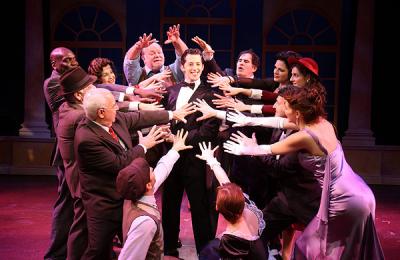‘Enter Laughing’ Fulfills Its Promise

An unlikely hero, Josh Grisetti has a face like a question mark. His raised eyebrows and nose are the curve and his often agape mouth forms the dot at its base. As the protagonist of “Enter Laughing,” he can mold that face like putty, looking doltish or debonair in the span of a second.
While he ably carries the musical comedy based on the early life of Carl Reiner, at the Bay Street Theatre this month, he is supported by a cast of strong group and individual performers, among them Jill Eikenberry, Richard Kind, and Michael Tucker. Those names may be familiar from “L.A. Law” or “Spin City,” but the cast includes other great performers such as Ray DeMattis, Erick Devine, Gerry McIntyre, Kate Shindle, and Emily Shoolin.
The play, set in the 1930s, takes place in a New York where the parents are all from the “old country” and radios and other electrical appliances are taken to a repair shop rather than recycled. It has the kind of old-style humor and musical numbers one might remember from television variety shows or reruns of Carol Burnett.
Mr. Reiner was a TV fixture for many years in the 1950s and 1960s on “Your Show of Shows” and “The Dick Van Dyck Show,” which he created and wrote as well as acted in. His 1958 novel “Enter Laughing” was first adapted to the stage in 1964, with a book by Joseph Stein, whose credits include “Fiddler on the Roof” and “Zorba.”
The show has had two successful runs off Broadway, with Mr. Grisetti earning much praise from critics and some awards. His ability to convince the audience of his gawkiness as well as his charm, in addition to his agility as a singer and dancer, make the show consistently engaging. Several of the actors who appeared with him in the earlier run at the York Theatre are in this production as well.
Bay Street’s presentation is a marvel of theatrical design and staging, once again demonstrating how so much can be done in such an intimate space. For musical numbers featuring the entire company of 14, the crowd may pack the small stage, but the players move agilely in and out of the wings and even the aisles.
For orchestration, the play makes do with a piano and bass at stage right and a drummer who provides other percussion but remains out of sight. It’s minimal, but plenty at the same time. Phil Reno, the pianist and musical director, takes the stage himself in one scene, adding another multitasking dimension.
The set design, by James Morgan, could not be simpler — design reduced to its essence. A window is the backdrop for Foreman’s Machine Shop, where David Kolowitz, the lead character, works as a delivery boy. The same window fronts a hat shop where he makes a delivery, and then a luncheonette where he has a date with his girl, Wanda. Chairs, counters, worktables, desks, a chaise longue and other elements are mostly brought in by cast members with a flourish and danced offstage when the scene changes.
The musical numbers are all impressive. The women in particular do great work, together or solo. The biggest crowd-pleaser, though, was a number by Mr. Tucker and Mr. DeMattis, “Hot Cha-Cha.” The two veteran performers threw in a few flourishes that were both unexpected and delightful.
The only sour note in the production comes from the story itself. The awkward and untalented David Kolowitz is a would-be actor who becomes a star despite himself, thanks to a dearth of talent in New York at that time. Although the situation is played for laughs and there’s a good-natured ending, David’s eventual acceptance is all too reminiscent of certain periods of prolonged mediocrity on the Great White Way in both production and playwriting. For this observer, the laughter, while often genuine, glossed over something sinister lurking beneath the cheerful veneer.
Performances of “Enter Laughing” will continue through Sept. 4. Tickets can be purchased through the box office or at www.BayStreet.org. The show’s producer, Dan Whitten, has since announced that he will bring it to Broadway after it ends its Sag Harbor run.
